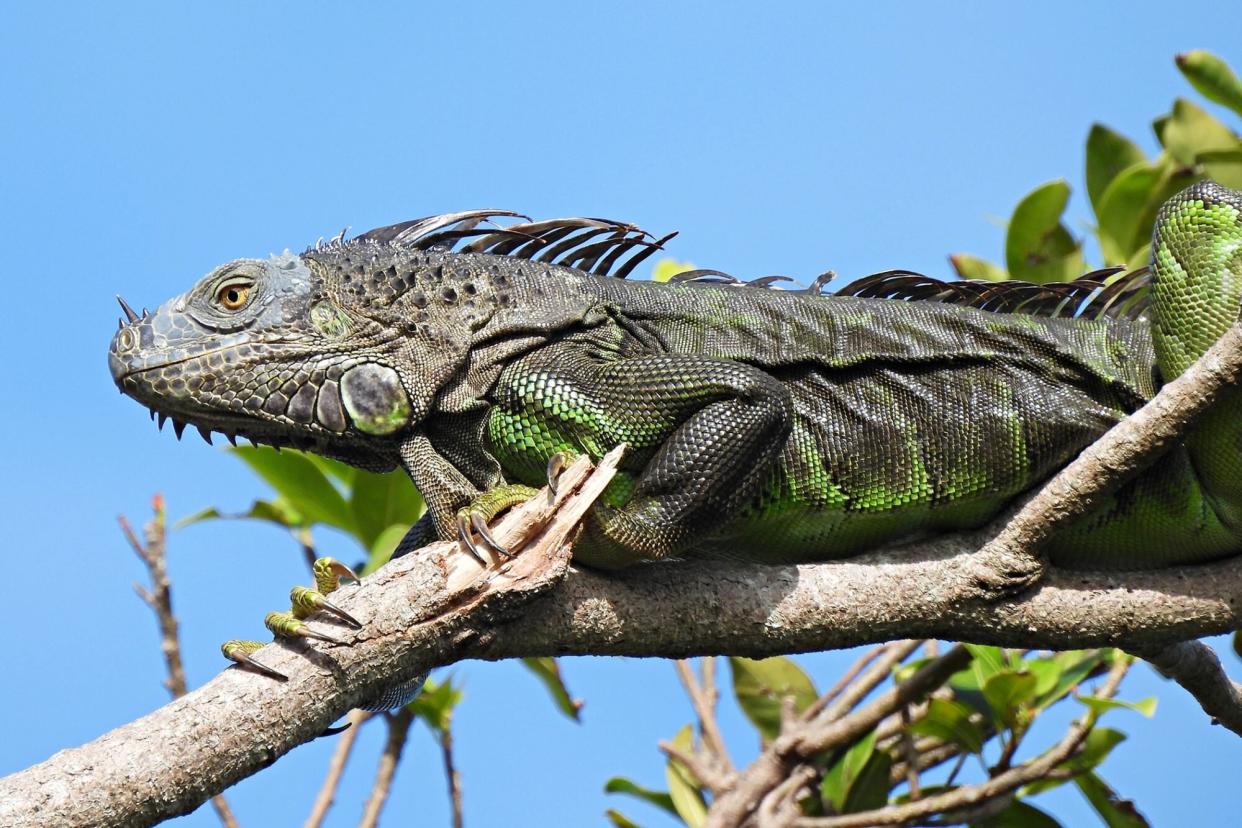Why Are Iguanas Falling From Trees in Florida?

passion4nature / Getty
The U.S. Federal Emergency Management Agency (FEMA) took to Twitter on Monday to warn its followers about something strange: iguanas falling from trees in Florida.
It may sound like a sign of the apocalypse, but the phenomenon is actually a result of the increasingly frigid, and more common, cold snaps South Florida is experiencing. Iguanas are cold-blooded and hang out in trees, bushes, and on rocks to soak up sunlight that warms their blood enough to function. But with temperatures in South Florida dipping to their coldest recorded temperatures since 2010, reptiles like iguanas are literally feeling the freeze.
In temperatures in the 40s Fahrenheit or below, iguanas can get so cold they become immobile and can no longer grasp branches, causing them to fall from their perches. That's what happened on Sunday morning, when temperatures across South Florida dove into the 30s and even 20s, according to the National Weather Service.
While some fallen iguanas are indeed dead, many are in a cold-induced deep sleep and can suddenly come back to life upon warming up.
RELATED: Find an Orphaned Baby Animal in the Wild? Here's What to Do
Jan 30: A cold morning...not as cold as our friends to the north dealing with a blizzard...but we have our own lizards to worry about.
Did you really think with the coldest temperatures in over a decade we would not warn you about falling Iguanas? #Iguanas #flwx pic.twitter.com/ornSpetd6a— NWS Miami (@NWSMiami) January 30, 2022
People have been eager to help immobilized iguanas, posting comical pictures of seemingly lifeless iguanas dawning cold weather essentials like blankets and beanies. But experts say to stay clear from immobilized iguanas because they can become defensive and dangerous once they awaken.
#iguanas really do fall out of trees when it’s cold! #Fallingiguanas #babyitscoldoutside @wsvn @BrianWFTV pic.twitter.com/vin7YzBNGm
— Im just a girl (@AliciaHamvai) January 30, 2022
"If you come across a frozen iguana, leave it alone because they could harm you," FEMA wrote in its tweet.
This isn't the first time iguanas falling from trees in Florida and cold-affected reptiles have made headlines. In 2010, a brutal cold snap killed many South Florida iguanas. And although this may sound like a tragedy, iguanas aren't really native to The Sunshine State.
While iguanas are prevalent in South Florida, they are actually an invasive species. Introduced to Florida during the 1960s and '70s from Central America, some eastern Caribbean Islands, and tropical regions of South America via cargo ships and human releases, iguanas have since harmed Florida's native plants and animals and damaged natural and man-made structures alike with their elaborate burrows and infectious, bacteria-ridden feces.
But cold spells are unlikely to devastate Florida iguana populations. A 2020 study found some lizards around Miami have evolved to withstand temperatures in the range of 1.8–7.2 degrees Fahrenheit colder than they could in 2016.

